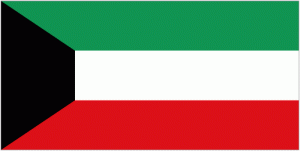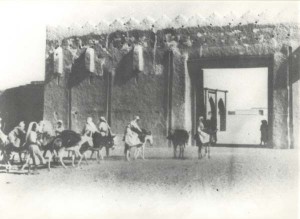February 25

This week Kuwait celebrates two national holidays: Independence Day and Liberation Day.
Though Kuwait officially became independent on June 19, 1961, National Day is celebrated in February in honor of Sheikh Abdullah Al Salim Al Sabah (1895-1965) who came to power in February 1950. [And possibly because it’s too hot to go outdoors in June.] The Emir guided Kuwait during its transformation to modern statehood and earned the moniker “Father of the Constitution.”
On this day teens and adolescents celebrate by spraying untold volumes of silly string on passing motorists on the Gulf Road. What the connection is, no one knows, but as one motorist writes:
“…despite our best efforts to avoid gulf road, there is no getting away w/ these foamy sprays. They will run after you. Chase you down the road. They will even open your door, because having white foams sprayed on your car interior is even funnier than the outside.”
Although archeologists have found indications of settlements as far back as 4500 BC, the area that is now Kuwait was largely uninhabited up until the 18th century.
The same family of Sheiks has ruled Kuwait since the 1750s, when Kuwait’s location on the Persian Gulf made it a thriving port.
The sovereignty of Kuwait gets shady in the late 19th century due to conflicting claims by the Ottoman and British Empires and by Kuwait itself.

Kuwait enjoyed the ambiguous status of a caza, an autonomous city by the Ottoman Empire, but in 1899 it began a fungible relationship with Britain, sacrificing some autonomy in return for British naval protection. Britain wanted to secure access through the Gulf—a major transit point between England and India—and block Germany and its Ottoman allies.
In the 1930s the discovery of oil changed the fate of the country overnight. At that time pearl-diving was a leading occupation for Kuwaitis; two decades later the small nation would be one of the world’s leading oil exporters.
Kuwait gained independence from Britain on June 19, 1961, and the following year Kuwait became the first country in the Gulf region to adopt a Constitution and parliament.
In 1974 Kuwait nationalized the Kuwait Oil Company, created by British Petroleum and Gulf Oil in 1934.
Other facts about Kuwait:
The population skyrocketed from 200,000 to 3 million over the past 50 years. An estimated 2 million are non-nationals. Residents must have lived in the country for 20 years to vote. And women weren’t granted suffrage until 2005.
Despite being the first democracy in the region, political parties are not allowed. A group of activists defied the ban in 2005, creating their own party, and were arrested for plotting to overthrow the government.


Please we need more on the past of Kuwait.
It is great to celebrate Independence and liberation, amid economic and infrastructural development. Countries like Nigeria should learn that the oil wealth can turn a desert into milk and Honey, if manage properly.
Mustapha Mohammed
Broadcast Journalist
Abuja
Nigeria